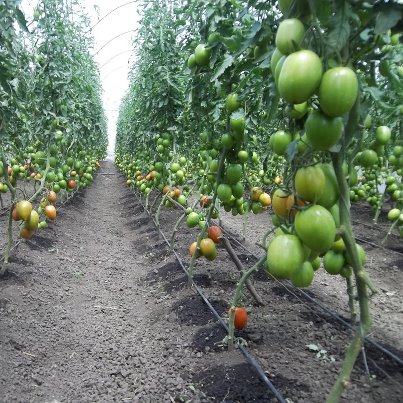Tomato is one of the most important local vegetable crops in Kenya. It is ranked second to Brassicas (cabbage and kales) in production but first in value. In year 2013, the area under tomato was 23,000 ha and production was 494,000 Metric tons valued at KES 14 billion (HCDA, 2013). Tomatoes are grown in many agro-ecological zones including semi-arid areas where the crop is grown with supplementary irrigation mainly by smallholder farmers.
The major growing areas are Migori, Bungoma, Kajiado, Kericho, Makueni, Kirinyaga, Nakuru, Lamu and Kiambu. Tomato has become a popular enterprise because of its high yield potential and attractive prices especially during times of scarcity making it a significant contributor to the horticultural subsector (MoA, 2004, GoK, 2007).
Common soil borne Pest in Tomatoes
Pests and diseases are amongst the major constraints in tomato production, particularly the soil- borne pathogens that are capable of surviving in the soil for long durations. Soil is a reservoir for many plant pathogens and when conditions become favorable; the plants become infected by the pathogens and develop disease. These soil borne pathogens may cause diseases such as, bacterial wilt, Fusarium wilt and damping off disease. Bacterial and fusarium wilts are responsible for severe losses of up to 75 -100% leading to high economic losses in tomatoes and potatoes.
Damping-off disease, which is caused by several soil borne pathogens, is capable of wiping out the entire tomato crop at the nursery level.
 Tomatoes are also affected by other pests found in the soil and especially the root knot nematode (Figure 1) while weeds compete with the crop for available nutrients and water leading to high economic losses.
Tomatoes are also affected by other pests found in the soil and especially the root knot nematode (Figure 1) while weeds compete with the crop for available nutrients and water leading to high economic losses.
 There is need to address the management of soil borne pests (diseases, pests such as nematodes and weeds) to reduce losses thus enhancing tomato quality and yields with overall objective of increasing farm incomes Currently, many farmers rely on chemical pesticides as a method of protecting crops against soil-borne pathogens.
There is need to address the management of soil borne pests (diseases, pests such as nematodes and weeds) to reduce losses thus enhancing tomato quality and yields with overall objective of increasing farm incomes Currently, many farmers rely on chemical pesticides as a method of protecting crops against soil-borne pathogens.
However, use of chemical pesticides may not be desirable due to the potential risk to the environment as well as human and animal health and therefore should be used as a last resort. As a result of these risks, increased restrictions have been imposed on a variety of chemical pesticides in Kenya for example use of Methyl Bromide as a soil fumigant.
Alternatives to use of pesticides for management of soil borne pathogens are available, for example use of Integrated Pest Management (IPM) approaches. Some of the promising alternatives or IPM approaches for the management of soil borne pathogens include soil solarization, soil heat treatment and fumigation.


